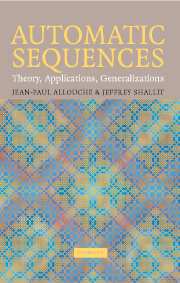Book contents
- Frontmatter
- Contents
- Preface
- 1 Stringology
- 2 Number Theory and Algebra
- 3 Numeration Systems
- 4 Finite Automata and Other Models of Computation
- 5 Automatic Sequences
- 6 Uniform Morphisms and Automatic Sequences
- 7 Morphic Sequences
- 8 Frequency of Letters
- 9 Characteristic Words
- 10 Subwords
- 11 Cobham's Theorem
- 12 Formal Power Series
- 13 Automatic Real Numbers
- 14 Multidimensional Automatic Sequences
- 15 Automaticity
- 16 k-Regular Sequences
- 17 Physics
- Appendix Hints, References, and Solutions for Selected Exercises
- Bibliography
- Index
16 - k-Regular Sequences
Published online by Cambridge University Press: 13 October 2009
- Frontmatter
- Contents
- Preface
- 1 Stringology
- 2 Number Theory and Algebra
- 3 Numeration Systems
- 4 Finite Automata and Other Models of Computation
- 5 Automatic Sequences
- 6 Uniform Morphisms and Automatic Sequences
- 7 Morphic Sequences
- 8 Frequency of Letters
- 9 Characteristic Words
- 10 Subwords
- 11 Cobham's Theorem
- 12 Formal Power Series
- 13 Automatic Real Numbers
- 14 Multidimensional Automatic Sequences
- 15 Automaticity
- 16 k-Regular Sequences
- 17 Physics
- Appendix Hints, References, and Solutions for Selected Exercises
- Bibliography
- Index
Summary
Up to now in this book we have dealt almost exclusively with sequences over a finite alphabet. While many interesting sequences, such as the Thue—Morse sequence, are of this form, there are also a large number of well-studied sequences over infinite alphabets such as Z. This naturally suggests the question of how the class of k-automatic sequences can be fruitfully generalized to the case of infinite alphabets.
In this chapter we examine one such possible generalization, called the class of k-regular sequences.
Basics
Recall that a sequence is k-automatic if and only if its k-kernel is finite. We say a sequence is k-regular if the Z-module generated by its k-kernel is finitely generated. (More general definitions are possible, but we do not cover them here.)
Example 16.1.1 Consider the function s2(n) introduced in Chapter 3, which counts the sum of the bits in the binary expansion of n. If i ≥ 0 and 0 ≤ b < 2i, then we have s2(2in + b) = s2(n) + s2(b). It follows that every element of the 2-kernel of the sequence (s2(n))n≥0 can be written as a Z-linear combination of the sequence (s2(n))n≥0 and the constant sequence 1. This is a prototypical example of a k-regular sequence.
Information
- Type
- Chapter
- Information
- Automatic SequencesTheory, Applications, Generalizations, pp. 438 - 454Publisher: Cambridge University PressPrint publication year: 2003
